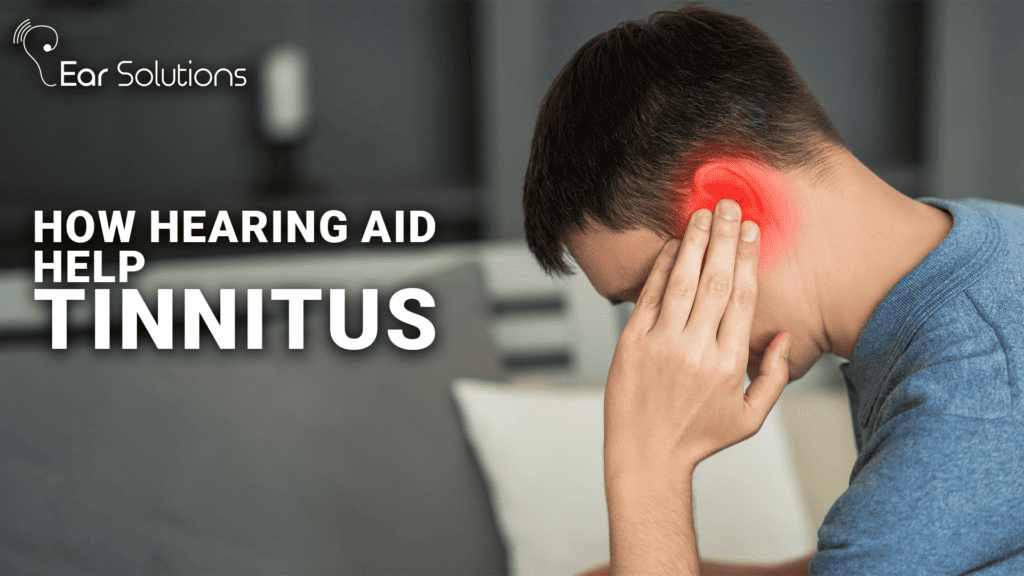Hearing Aid
How Hearing Aid Help Tinnitus?
How Hearing Aid Help Tinnitus? This is the most frequent question that tinnitus sufferers have when hearing aids are recommended. Before answering this query, first we need to understand what is tinnitus and what are its causes and symptoms.
In this Blog, we are going to answer all these questions briefly.
What is Tinnitus?
The sense of sound when there is no external source of sound is known as Tinnitus. It is often described as a ringing, buzzing, hissing, roaring, or clicking sound in the ears. Tinnitus can be irregular or constant and its intensity can vary. It may affect single or both ears and can have a significant impact on a person’s quality of life.
Tinnitus Symptoms
Talking about the Symptoms of Tinnitus, the primary symptom is the perception of sound that is not present in the external environment. The sound can diversify in pitch and volume. Some people may experience a high-pitched ringing, while some may perceive a low-frequency hum or vibrating noise.
Tinnitus can be subjective, where only the person experiencing it can hear the sound, or objective, where the sound can also be detected by a healthcare professional during an examination. Along with sound, tinnitus can be accompanied by other symptoms such as difficulty in concentrating, sleep disturbances, irritability, anxiety, and depression.
Tinnitus Causes
There are various causes of tinnitus and some of the common causes of tinnitus include:
Noise-induced hearing loss: Exposure to loud noises, such as concerts, machinery, or firearms, can damage the hair cells in the inner ear which can lead to tinnitus.
Earwax blockage: The buildup of earwax can cause irritation or blockage in the ear canal, leading to tinnitus symptoms.
Medications: Certain medications, such as high doses of aspirin, some antibiotics, and cancer drugs, can cause or worsen tinnitus as a side effect.
Age-related hearing loss: Gradual hearing loss due to aging can also be connected with tinnitus.
Ear and sinus infections: Infections in the ear or sinus can result in tinnitus symptoms.
Medical conditions: Tinnitus can be associated with various medical conditions, including Meniere’s disease, temporomandibular joint (TMJ) disorders, otosclerosis, and cardiovascular disorders.
Emotional and physical stress: Stress and anxiety can increase tinnitus symptoms or make them more noticeable.
Tinnitus Treatment: Restoring Harmony to Your Hearing
While there is no known cure for tinnitus, several treatment options can help manage its impact:
Sound therapy: Sound therapy aims to provide relief by introducing external sounds to mask or distract from tinnitus. This can be achieved through the use of hearing aids, sound generators, smartphone apps that play soothing sounds, or customized soundscapes.
Cognitive behavioral therapy (CBT): CBT or Cognitive Behavioral Therapy helps individuals develop coping strategies and change their emotional and behavioral responses to tinnitus. It focuses on reducing stress and improving quality of life.
Medications: In some cases, medications may be prescribed to manage associated symptoms, such as anxiety or depression, which can worsen tinnitus.
Tinnitus retraining therapy (TRT): TRT combines sound therapy with counseling to help individuals adapt the perception of tinnitus and reduce its impact on daily life.
Stress management techniques: Techniques like relaxation exercises, meditation, and counseling can help manage stress, which can contribute to tinnitus symptoms.
Treating underlying conditions: Addressing underlying medical conditions or hearing loss through appropriate medical check-ups or hearing aids may help reduce tinnitus symptoms.
It’s recommended to seek professional medical evaluation and guidance from an audiologist or hearing care specialist to determine the cause and find the most suitable treatment options.
How Hearing Aids Help Tinnitus?
Sound Masking: Hearing aids help by introducing background noise or soothing sounds, known as sound masking or sound therapy, which can reduce the contrast between tinnitus and the surrounding silence. This can make the tinnitus less noticeable.
Amplification: Hearing aids amplify external sounds, including speech and environmental sounds. By enhancing these external sounds, hearing aids help to divert attention from tinnitus, making it less important in the wearer’s perception. This amplification can also improve overall communication and sound awareness.
Improved Hearing Ability: Hearing loss and tinnitus often coexist. Treating hearing loss with hearing aids not only helps individuals hear better but also indirectly reduces tinnitus. By improving the audibility of external sounds, hearing aids enhance the overall auditory experience, reducing the brain’s focus on internal tinnitus sounds.
Personalized Programming: Modern hearing aids can be programmed to address specific tinnitus concerns. Hearing Care Experts can adjust the settings of hearing aids to match the individual’s hearing loss profile and tinnitus characteristics. Customizable features such as frequency shaping, volume controls, and specialized tinnitus programs can be utilized to tailor the hearing aids to the wearer’s unique needs.
Psychological Support: Tinnitus can lead to emotional distress, anxiety, and depression for some individuals. Hearing aids not only provide auditory benefits but also offer psychological support. They can restore confidence in communication, improve social interactions, and alleviate the emotional burden associated with tinnitus.
It’s important to note that while hearing aids can be helpful for tinnitus management, they may not eliminate tinnitus for everyone. The effectiveness of hearing aids in managing tinnitus varies from person to person.





